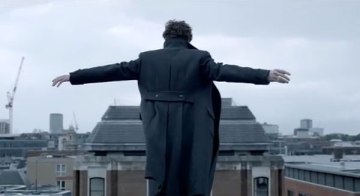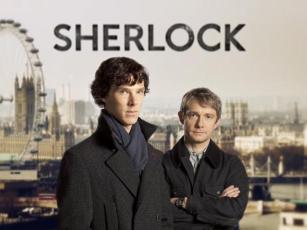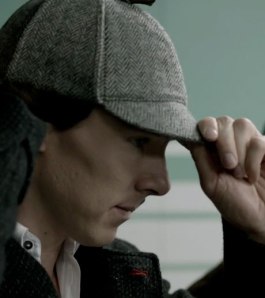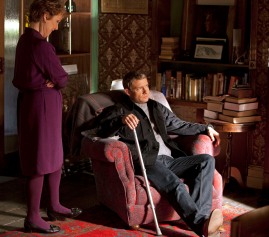For a while now, I’ve been hearing about a show everyone loves called Sherlock and an actor everyone loves called Benedict Cumberbatch.
Yep, that’s a dude’s name. Pretty awesome.
So after catching up on Breaking Bad and still full on loving my new Netflix subscription, Rob and I decided to watch the British spy-drama everyone had been talking about.
Overview (Spoiler Free)
Sherlock is a BBC miniseries that sets Sherlock Holmes stories in the modern day. It is, in a word, brilliant. The best thing they did was make the show very, very modern. Technology is used for everything, and the stories often revolve around it. Each episode is loosely based on a real Sherlock Holmes story, but only in theme. The plots and mysteries themselves are completely new, and very well crafted.
Benedict Cumberbatch plays Sherlock, an antisocial genius type who fancies himself a “consulting detective”. Cumberbatch plays him as almost a more attractive, more serious Sheldon Cooper – he’s a man who has always been the most brilliant person in the room by a mile, he has very Asperger’s-like tendencies and he’s painfully full of himself. Sherlock is most brilliant in his observations. He can look at a person and almost instantly know almost everything about them. The show does a great job of explaining those clues to us, in a flashy way that makes Sherlock’s brain seem like a clever computer program. It’s like he’s the living, breathing version of Watson on Jeopardy.
Speaking of Watson, he’s played by Martin Freeman who I know from The Office (Tim, on the British original) and some of you will soon know as Bilbo Baggins in the movie The Hobbit. In this interpretation, Dr. Watson is an ex-military doctor who meets Sherlock when he moves back to London and needs a flatmate to help make ends meet. Soon he’s living at 221B Baker Street, having Mrs. Hudson making him tea and helping his new roommate solve crimes. Watson starts up a blog chronicling their cases, which gains Sherlock notoriety in England and helps them come across new cases. I love this twist, especially because of how it plays into the very thrilling final episode in series 2.
Each series has three episodes, and each episode is 90 minutes long. This format works perfectly for the show, because each installment is more like a movie than a regular television episode and the length allows the writers to weave a really good mystery. There are twists and red herrings, and I never find myself getting bored during an episode. Throughout both seasons there have been longer arcs playing out, specifically to do with Sherlock’s arch-nemesis Moriarty.
Episodes (Not for those who’ve yet to watch!)
The first episode of the series, “A Study in Pink”, really drew me in. The characters and their relationships felt very natural, thanks in a large part I think to the chemistry Cumberbatch and Freeman have. In this episode, the police are investigating a string of apparent suicides in which a person has gone to a desolate location and taken a lethal pill. Sherlock knows they’re not suicides, but murders. The process for figuring that out and discovering how someone was managing to pull it off was captivating, and that’s when I knew I’d love the show. Revealing that it was Moriarty that put the murderer up to the crime was a good twist, because it introduced the villain without actually showing him yet.
“The Blind Banker” was another thrilling installment, and I’ve always liked things that had to do with deciphering codes and symbols. There was a lot going on in this episode, but it was all woven together perfectly.
Although “The Great Game” was the last installment in series one, it was probably my least favorite of the three episodes. But that’s very relative – it was still a very thrilling story, as Moriarty demanded Sherlock to solve mystery after mystery by placing the lives of innocent citizens at stake. Had I not had series two already queued up, that cliffhanger ended would have killed me.
The first episode of series two, “A Scandal in Belgravia”, is really excellent. Sherlock has to retrieve scandalous photos of a minor female royal (Beatrice or Eugenie? Or maybe Pippa?) from a well-known dominatrix. Irene Adler isn’t just a typical for-hire girl though, she’s very smart. The twists and turns in this installment never seemed to end, and the sexual tension between Sherlock (who’d previously shown no interest in either sex) and Irene added an interesting new layer to his character.
The second episode, “The Hound of the Baskervilles”, was based on a story that I’m actually familiar with. (Via the children’s TV show Wishbone, though, so…yeah.) I liked how this one intertwined a crime that occurred many years earlier with crimes happening now.
The final episode of series two, “The Reichenbach Fall”, is probably my favorite because all the Moriarty threads that had been placed all along finally came together. Moriarty committed a series of crimes only to allow himself to be caught, and then threatened the jury to ensure he’d get off. Why? It seemed like he just wanted to announce his capabilities to the criminal world, but it was much better than that. He’d set up a complicated trap that made it look as though Sherlock had been causing all of the crimes he’d solved, just to make himself look good. (I was very young when I watched the show Early Edition, but I remember that the police thought this of Kyle Chandler as well.) It was a great culmination of all the episodes thus far. In the very first episode, we knew that the second-in-command to Lestrade thought this about Sherlock. Watson’s blog had slowly been garnering more fame for the duo, so suddenly Sherlock was much more high profile and the public was ready to believe this scandal.
 The final straw is Sherlock’s suicide, and this is where it gets crazy. On the roof of the hospital, Moriarty told Sherlock that assassins were in place to kill Lestrade, Watson and Mrs. Hudson unless Sherlock killed himself. Sherlock realized that he could avoid both if he could only get the code word out of Moriarty to call off the mission. To prevent that from happening, Moriarty shot himself, leaving Sherlock no option. Sherlock jumped – but we knew he’d come up with some kind of plan with poor, sweet Molly. At the very end of the episode, it’s revealed that Sherlock did indeed fake his death – but how? HOW? I cannot wait for series three to begin to reveal that to us.
The final straw is Sherlock’s suicide, and this is where it gets crazy. On the roof of the hospital, Moriarty told Sherlock that assassins were in place to kill Lestrade, Watson and Mrs. Hudson unless Sherlock killed himself. Sherlock realized that he could avoid both if he could only get the code word out of Moriarty to call off the mission. To prevent that from happening, Moriarty shot himself, leaving Sherlock no option. Sherlock jumped – but we knew he’d come up with some kind of plan with poor, sweet Molly. At the very end of the episode, it’s revealed that Sherlock did indeed fake his death – but how? HOW? I cannot wait for series three to begin to reveal that to us.
Unfortunately, it’ll be a bit of a wait. Production of series three doesn’t even begin until January 2013. The first episode will be loosely based on the story “The Adventure of the Empty House”, in which Sir Arthur Conan Doyle revealed that Sherlock Holmes had faked his own death. I’m assuming that Moriarty did indeed die in the series two finale, but I’ve read that whether his death was faked or not, he won’t be featured heavily in future episodes.
Are you guys watching Sherlock? Which episode is your favorite? Are you dying to know how Sherlock pulled off that fake suicide? Hit the comments!
Source: http://feedproxy.google.com/~r/Couchtime/~3/HW3P9p2WKVM/





